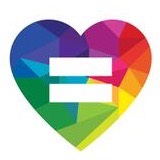In the run-up to Ireland’s Marriage Equality referendum on May 22nd, I’ve invited a series of guest posters– people from Ireland or who live here, of many different backgrounds and orientations- to share their thoughts on the referendum, the campaign, and what it means to them. Contributions to Guest Posts for Equality are welcome- drop me a message.
When not freely giving her unsought opinion on a wide range of topics, Fiona works half the week as a designer, photographer and social media manager (both of which can be found on Facebook) and spends the other half trying to negotiate/trick/bribe her three year old into just being sound.
Legend has it that when Queen Victoria signed the Criminal Law Amendment Act in 1885, banning oral sex between males, no banning or even mention of oral sex between females was included because she refused to believe that lesbians even existed. The credibility of that legend has been disputed, but if the late monarch found herself in Ireland during the Marriage Equality Referendum debate, she could be forgiven for holding that very belief. The invisibility of lesbians, their lives and their relationships during this debate has been quite shocking and incredibly insulting to all LGBT women, especially those working tirelessly on the campaign.
Despite the fact that the marriage equality referendum in Ireland owes a huge amount of its success to date to Ann Louise Gilligan and Katherine Zappone, almost every debate has been framed in the context of two men. In discussions where Paddy Manning and Keith Mills obsessively bookend every sentence they utter with the phrase “I’m a gay man”, and Eileen King – as a woman – finds it deeply offensive that the Yes campaign are trying to “remove” women from marriage, LGBT women, afraid to rock the boat and deflect from the real campaign issues, are left facetiously asking each other on Twitter how they suddenly mastered a collective disappearing act.
Obviously, this is largely down to the No campaign, who are using the example they know plays on the fears of those opposed to surrogacy and the one that will unsettle their staunchest voting demographic (middle aged and elderly men). There appears to be a bid to convince the electorate that, if passed, we’ll wake up on 23rd May in some sort of a post-referendum dystopian wasteland, where gay men forcibly marry all the straight men, kidnap fertile women, chain them up and use their ripe ovaries and juicy wombs to create a surrogate baby production line. However, the Yes side, committed to running a positive campaign focused only on the relevant issues, have been slow to take an active role in trying to create gender balance within the debate.
The only satisfaction to be derived is from appreciating two sweet ironies – one that the No side, who argue so vehemently about the importance of maintaining gender balance (cringingly described as “yin and yang” by Breda O’Brien) and women’s traditional roles, have deliberately tried to remove any mention of the women that this referendum affects the most. And secondly, that, if passed, it will undoubtedly be women voters who push the referendum over the line.
It can be argued that currently and historically, nationally and internationally, women are more politically and socially progressive. During this campaign, official polls and anecdotal evidence from canvassers have reflected that, with women of all ages more like to to be Yes voters. Take a walk through Dublin and I bet you’ll see more women and girls wearing Yes Equality badges.
From my own conversations during canvassing and with friends and relatives, I’ve been struck by how many older women, of a generation we might assume to be overly influenced by their husbands and male clerical figures, have given us a strong ‘Yes’. For this same reason, Daniel O’Donnell’s recent statement in favour of a Yes vote will have come as a blow to the No campaign – these women are unpredictable and flexible. They will not be controlled, they will listen to both sides of the story and make up their own mind.
The flip side of this coin is that the whole discourse has also been incredibly demeaning and insulting to men, especially fathers. It has played up to a tired cliché that paints husbands, fathers and men in general as irresponsible, infantile and barely able to look after themselves, let alone be trusted to care for a child. This trite tale isn’t fooling modern Ireland. We’ve seen a huge increase in stay-at-home fathers since the recession, and working fathers are significantly more hands-on than the generation before them. The vast majority of voters know from first-hand experience that a man can provide his child with the same care, love, attention, and affection as a woman.
Next week, regardless of the outcome, the Irish LGBT community needs to examine how and why, in so many debates and conversations, it allowed its female members to be thrown under the campaign bus and to remember that being part of a group that tries to dismantle patriarchy, does not make us immune to it.


